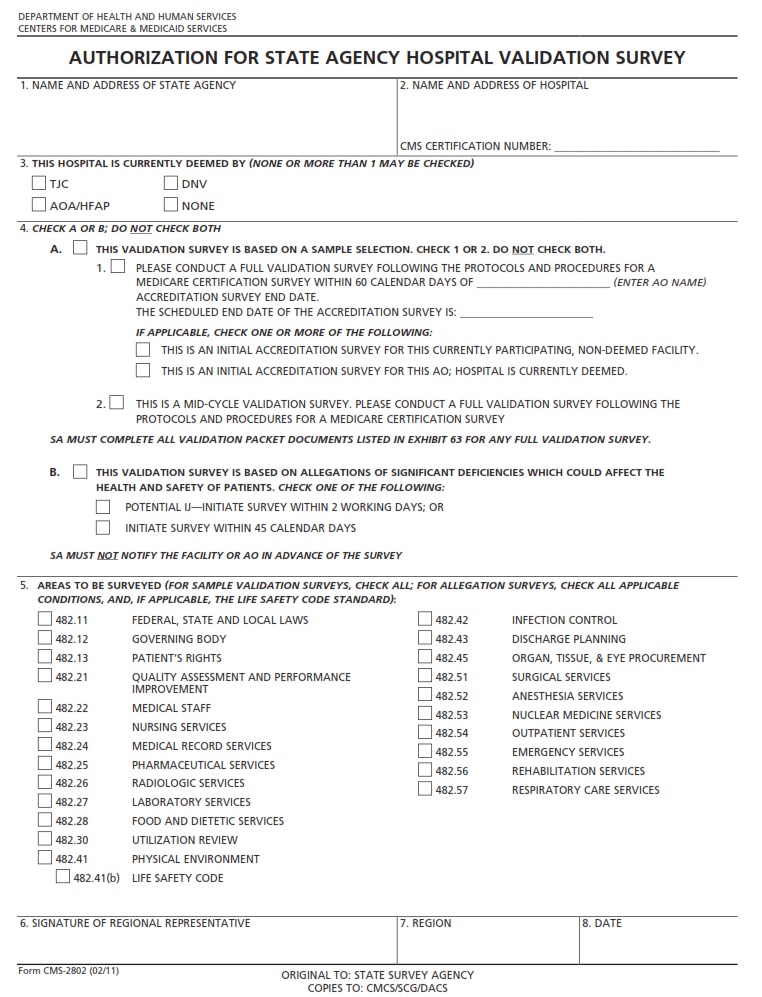CMSFORM.ORG – CMS 2802 – REQUEST FOR VALIDATION OF ACCREDITATION – In the intricate world of healthcare accreditation, the CMS 2802 form stands as a pivotal document that can shape the fate of healthcare facilities. It serves as a gateway to validation, a beacon of assurance in an industry where quality and standards reign supreme. Imagine it as a key that unlocks doors to excellence, a tool wielded by organizations striving for recognition and credibility in the eyes of both patients and peers alike. The journey towards accreditation is not merely bureaucratic; it symbolizes a commitment to upholding the highest standards of patient care and safety. Join us as we delve into the realm of CMS 2802 – Request for Validation of Accreditation, exploring its significance, intricacies, and impact on the ever-evolving landscape of healthcare quality assurance.
Download CMS 2802 – REQUEST FOR VALIDATION OF ACCREDITATION
| Form Number | CMS 2802 |
| Form Title | REQUEST FOR VALIDATION OF ACCREDITATION |
| Published | 2011-02-01 |
| O.M.B. | – |
| File Size | 108 KB |
CMS 2802 - REQUEST FOR VALIDATION OF ACCREDITATION (2621 downloads )
What is a CMS 2802?
The CMS 2802, also known as the Request for Validation of Accreditation, plays a crucial role in ensuring the quality and reliability of healthcare facilities. It serves as a formal documentation process through which accrediting organizations provide evidence of compliance with established standards and guidelines. By submitting the CMS 2802, healthcare entities demonstrate their commitment to maintaining high standards and meeting regulatory requirements.
Accreditation is not just a bureaucratic formality; it signifies a dedication to upholding excellence in patient care and safety. The CMS 2802 validates that organizations have undergone rigorous evaluations to ensure they meet specific performance measures and quality benchmarks. This process fosters continuous improvement within healthcare institutions, driving innovation and best practices in delivering services to patients.
Where Can I Find a CMS 2802?
If you are searching for a CMS 2802 form, you may find it challenging to locate one. The CMS 2802 is a specific request for the validation of accreditation, and it can typically be obtained from official accrediting bodies or organizations. One common source for the CMS 2802 form is the Centers for Medicare & Medicaid Services (CMS) website, where you can find a variety of healthcare-related forms available for download.
Another option to consider is reaching out directly to your accrediting agency or organization to inquire about obtaining a copy of the CMS 2802 form. Additionally, some third-party websites may offer copies of the form for download, but it’s essential to ensure its validity and legitimacy before use. Overall, persistence and thorough research are key when trying to track down a specific form like the CMS 2802 in order to ensure compliance with accreditation requirements and standards.
CMS 2802 – REQUEST FOR VALIDATION OF ACCREDITATION
The CMS 2802 form, also known as the Request for Validation of Accreditation, plays a crucial role in the accreditation process for healthcare organizations. This form serves as a formal request to the Centers for Medicare & Medicaid Services (CMS) seeking validation of an organization’s accreditation status, ensuring compliance with federal regulations and quality standards. By submitting this document, healthcare facilities demonstrate their commitment to upholding high standards of care and regulatory requirements set forth by CMS.
Accreditation validation through the CMS 2802 form not only validates the quality and safety of healthcare services but also enhances transparency and accountability within the industry. Healthcare organizations that successfully undergo accreditation validation exhibit a dedication to continuous improvement and patient-centered care, fostering trust among patients, providers, and regulatory bodies alike. Through this process, organizations can identify areas for enhancement, implement best practices, and ultimately improve outcomes for patients while maintaining compliance with regulatory guidelines.
